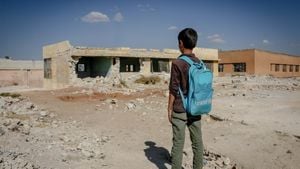South Africa is expressing deep concerns over the potential impact of Donald Trump’s recent election victory on international climate talks. The country is particularly anxious about how Trump's policies may affect the COP29 negotiations aimed at addressing climate change and reducing global warming. This apprehension is not limited to South Africa, as global partners are also apprehensive about the impact of Trump's administration on their collective efforts to tackle environmental issues.
The backdrop of this concern is the upcoming COP29 talks, set to take place shortly after Trump’s election and amid political upheavals, such as the collapse of Germany’s coalition government. Both events have raised alarms for countries relying on international cooperation and funding to address climate challenges. Scientists warn of increasingly destructive weather events—hurricanes, floods, and heat waves—linked to climate change. The urgency for strong action at global forums like COP29 has never been more apparent.
South Africa’s Environment Minister, Dion George, articulated these concerns, stating, "We are concerned about America because we don’t know what they’re going to do... how (it) is going to approach COP." This confusion is compounded by Trump's previously expressed stance on climate change, including his intention to withdraw from the Paris Agreement. Such uncertainty leaves many developing countries worried about the financial and diplomatic support they could receive under another Trump administration.
For South Africa, which ranks among the world's top 15 greenhouse gas emitters and is responsible for roughly 30 percent of Africa's emissions, the stakes are particularly high. The country has accepted around $11.6 billion from wealthier nations to transition from coal-dependent energy to renewable sources. Trump's election could alter the dynamics of these aid agreements, jeopardizing the funding needed for South Africa’s climate programs.
George noted, "It’s certainly not enough. We need another target." He pointed out the slow response time of rich nations to their climate pledges, which are dictated by shifting political landscapes. South Africa leads the charge for more equitable climate financing, advocating for wealthier nations to honor their commitment to provide at least $100 billion annually to support developing countries. The fears surrounding Trump are rooted not only in his past actions but also the potential messaging it sends to other nations during COP29. If the U.S. retracts its commitments, poorer nations may feel de-motivated to follow through with their pledges.
The South African minister also expressed relief at receiving assurance from German officials about maintaining Europe’s dedication to climate initiatives, regardless of their internal political strife. Jennifer Morgan, Germany’s State Secretary for International Climate Action, reportedly communicated to George, emphasizing the European Union's unwavering stance. "Their position is not changed and that's how they will approach COP," he said, showcasing some hope amid the uncertainty.
The upcoming climate conference is seen as pivotal, with world leaders expected to forge agreements to address the pressing climate crisis. Developing nations, particularly those like South Africa, are on the frontline, bearing disproportionate impacts of climate disasters fueled by the emissions of wealthier countries. Activism and advocacy for responsible climate policy enforcement are likely to intensify as COP29 approaches, accompanied by calls for accountability from leading historical emitters.
Meanwhile, the political climate within the U.S. remains complex. With Trump at the helm, international partners remain cautious, assessing how his administration will influence global climate dynamics. The upcoming COP29 will serve not only as a battleground for environmental policies but also as a test of global solidarity among nations striving for climate justice. Many developing countries look to the United States for leadership, as previous commitments under the Biden administration strengthened hopes for collaborative approaches to climate change.
Consequently, apprehensions about the future of international climate negotiations are running high. How Trump will navigate these issues remains uncertain, but the stakes are clear: the future of global climate efforts hangs in the balance as nations prepare to gather for COP29.



